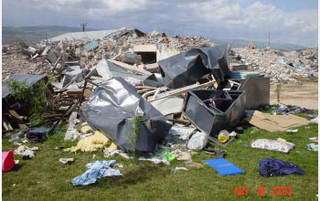According to a recent report, a small number of reinforced concrete walls would have been sufficient to keep schools, dormitories and other buildings standing after the 2003 earthquake in Bingöl, Turkey. An American-Turkish team of engineers said many of the 168 deaths could have been prevented had builders followed Turkey's existing structural codes.
Image: In the foreground lie the remains of steel lockers and beds, amidst other debris, from Celtiksuyu Boarding School. The school was devastated by the May 2003 earthquake in Bingol, Turkey. Credit: William A. Mitchell, Earthquake Engineering Research Institute (EERI)
Led by Purdue University civil engineering professors Julio Ramirez and Mete Sozen, the NSF-supported research team presented their findings at the 13th World Conference on Earthquake Engineering in 2004 and published their findings this past summer in the Canadian Association for Earthquake Engineering newsletter.
The researchers found that many of the failed buildings had "captive columns," slender, reinforced-concrete pillars that stand at the ends of shorter walls. The engineers consider the structures to be a "fundamental and classic" flaw -- when a quake strikes, the portion of the column above the wall is unsupported and receives the full brunt of seismic forces.
After each column breaks, the building's weight is held by fewer and fewer of these pillars, resulting in a domino effect. Had supporting walls been present, the pillars would not have moved as violently from side to side, and the walls would have supported some of the overlying load. That simple fix could have prevented the collapse of the school buildings.
The researchers, sponsored by the National Science Foundation (NSF) and TUBITAK, the NSF counterpart in Turkey, made their report available to Turkish officials. The researchers hope their report on the damage from the 6.4 magnitude quake will help influence construction practices.
While relatively few building modifications would be needed to upgrade existing buildings, researchers fear that the same scenario could play out again in Turkey, the Caribbean, Latin America and elsewhere if officials do not enforce codes more strictly.
Source: NSF
























